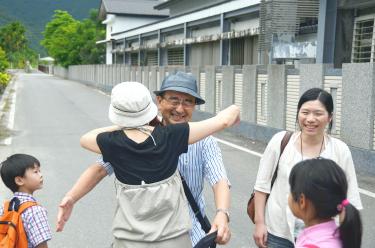Born in Taiwan, but forced to leave his home after Japan lost World War II, Kazuya Shimizu yesterday finally realized his dream of revisiting the site of the village in Hualien County where he was born.
The 70-year-old Shimizu is a wansei, the Japanese term used to describe someone born or who grew up in Taiwan and is a descendant of Japanese immigrants who had come to Taiwan during the Japanese occupation from 1895 to 1945.
Mika Tanaka, the woman who helped him find the site of the village, is a third-generation wansei. She was born in Japan and had come to Taiwan with her parents when she was six. Over the past decade, she has helped more than 130 wansei find the places where they, or their friends or family were born in Taiwan.
Tanaka said Shimizu sought her help after he failed to find the village where he was born — which was called Yoshino Immigrants’ Village at the time — the first two times that he visited Taiwan.
After consulting records detailing the geographical details around Yoshino Village and with the help of Shimizu’s descriptions, Tanaka was able to find the original site of Shimizu’s family house after discovering the wooden foundation under what is now a vegetable field.
Although the house was no longer there, Shimizu was nevertheless very moved to finally see again the place where he had spent the first three years of his life, thanking Tanaka profusely for helping him find his roots.
Along with Tanaka, Shimizu also visited Hualien County’s Chian Household Registration Office yesterday and received the complete records of his family’s household registration during their stay in Taiwan — from the time of Shimizu’s grandfather until their deportation.
“That’s me!” a very excite Shimizu said as he pointed to the record.
Shimizu’s grandfather came to Taiwan 105 years ago, and Shimizu’s father served as the chief of Yoshino Village, as well as the head of its post office, Tanaka said.
Tanaka added that she had also helped apply for the household registration records of five other wansei, now aged 91 to 94, and the records would be sent to Japan by courier.
“Hopefully the documents would sooth their longing for Taiwan — which to them was their second home — and the emptiness they felt after they were forced to leave,” she said.
Tanaka and Shimizu yesterday also visited the village cemetery to pay their respects and pray for the Japanese immigrants buried in Taiwan, including those who had committed suicide, either because they did not want to leave, or because they were unable to accept the news that Japan had lost the war.
Source: Taipei Times - 2012/08/18





















